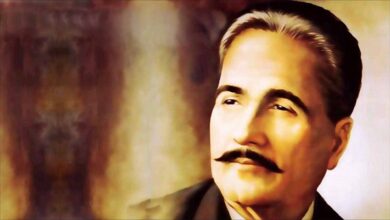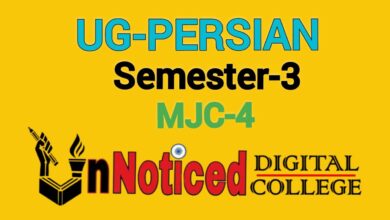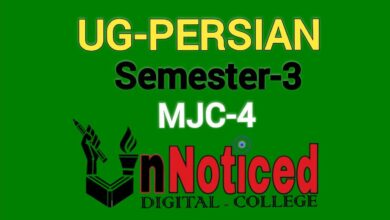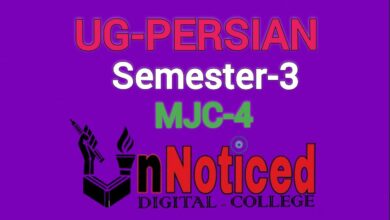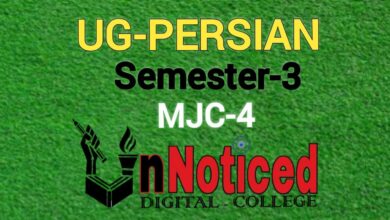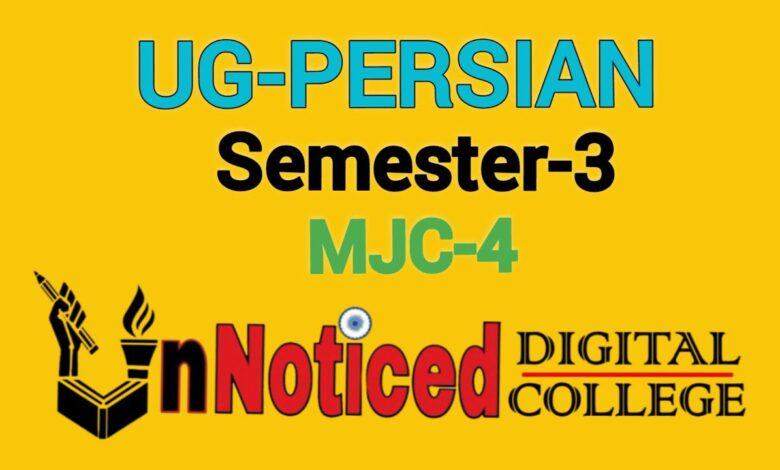
UG-Persian, Semester-3, MJC-4, Ques-1
غزل حافظ: “صلاح کار کجا اور میں خراب کجا”
Classical Persian Poetry
حافظ شیرازی کی غزل “صلاح کار کجا اور میں خراب کجا” ایک نہایت گہری اور خوبصورت غزل ہے جس میں شاعر نے انسان کی روحانی اور اخلاقی حالتوں کو بڑی حکمت اور تدبر کے ساتھ بیان کیا ہے۔ اس غزل میں حافظ نے اپنے فلسفۂ زندگی کو پیش کیا ہے، جس میں وہ انسان کی فطرت، اس کی جستجو، اس کے گناہوں اور توبہ کے امکانات کو پرکھتے ہیں۔ حافظ کی یہ غزل اس کی عرفانی شاعری کی نمایاں مثال ہے، جہاں وہ انسان کی داخلی دنیا اور اس کے تعلقات کو انتہائی خوبصورتی سے پیش کرتے ہیں۔
حافظ شیرازی کا تعارف
حافظ شیرازی، جنہیں عرف عام میں “حافظ” کے نام سے جانا جاتا ہے، 14ویں صدی کے عظیم فارسی شاعر تھے، جو ایرانی ادب کا ایک بے مثال ستون سمجھے جاتے ہیں۔ ان کا پورا نام خواجہ شمس الدین محمد بن بہاء الدین حافظ تھا اور وہ 1325 یا 1335 عیسوی کے قریب شیراز، ایران میں پیدا ہوئے۔ حافظ کی شاعری نہ صرف اس وقت کے ایران میں بلکہ پورے فارسی بولنے والے علاقے میں بے حد مقبول تھی، اور آج بھی ان کی غزلیں عالمی سطح پر پسند کی جاتی ہیں۔
حافظ کی شاعری میں مختلف موضوعات شامل ہیں، جن میں محبت، فلسفہ، اخلاقیات اور عرفان شامل ہیں۔ ان کی غزلوں میں عموماً جمالیات، خدا کی محبت، اور انسانی فطرت کے گہرے پہلوؤں کو بیان کیا گیا ہے۔ حافظ کا کلام زیادہ تر ان کی ذاتی تجربات، روحانی تلاش، اور سماجی اور سیاسی حالات کی عکاسی کرتا ہے۔
حافظ کی شاعری میں “تصوف” اور “عرفان” کا عنصر نمایاں ہے، جس میں انہوں نے روحانی بیداری اور خدا سے قربت کے موضوعات کو کھولا ہے۔ وہ ایک اعلیٰ درجہ کے عارف تھے، اور ان کی شاعری میں قرآن اور اسلامی تصوف کے اصولوں کی جھلکیاں ملتی ہیں۔ حافظ کی شاعری کے ذریعے انسان کو اللہ کے ساتھ تعلق، اپنی روح کی حقیقت کو سمجھنے، اور دنیاوی لذتوں سے پرہیز کی اہمیت کا شعور ہوتا ہے۔
1. غزل کے اشعار کی تفصیل
غزل “صلاح کار کجا اور میں خراب کجا؟” میں حافظ نے ایک نہایت اہم سوال اٹھایا ہے: انسان اپنی صلاحیتوں اور اچھے راستے کو کیسے پہچانے، جبکہ وہ خود اپنی حالت سے ناواقف ہوتا ہے؟ اس سوال کے ذریعے حافظ انسان کی خودشناسی اور اس کی روحانی جستجو پر روشنی ڈالتے ہیں۔ یہ سوال انسان کی محدودیتوں اور اس کی روحانی کمزوریوں کو ظاہر کرتا ہے، جو اسے اپنے حقیقت کی پہچان میں مشکل پیش آتی ہے۔
بیت 1:
“صلاح کار کجا اور میں خراب کجا؟“
یہ بیت انسانی کمزوری اور ہدایت کی تلاش کی عکاسی کرتی ہے۔ “صلاح کار” کا مطلب ہے وہ راستہ جو انسان کی فلاح اور بہتری کی طرف لے جائے، اور “خراب” سے مراد وہ حالت ہے جس میں انسان گناہ، خطا اور بے راہ روی کا شکار ہوتا ہے۔ حافظ یہاں انسان کے اندر کی کشمکش کو ظاہر کرتے ہیں کہ وہ اپنے راستے کی شناخت میں ناکام ہے اور وہ صحیح اور غلط کے بیچ پھنس چکا ہے۔
بیت 2:
“خُود میں ہوں متشابہات، حیرت میں ہوں، اگرچہ ہزاروں میں ہوں۔“
یہ بیت انسان کے اندر کی گمراہی اور خودی کی تلاش کو ظاہر کرتی ہے۔ حافظ اس بات کا اعتراف کرتے ہیں کہ وہ خود بھی اپنی حقیقت سے بے خبر ہیں اور ہزاروں لوگوں میں گم ہیں، حالانکہ وہ دراصل حقیقت کی جستجو میں ہیں۔
بیت 3:
“نازک ہے دل کی حالت، باطنی غموں میں الجھ گئے ہیں ہم۔“
حافظ اس بیت میں انسان کے باطن میں موجود غم اور الجھنوں کو بیان کرتے ہیں۔ دل کی حالت نازک ہے اور انسان اپنی داخلی کشمکش کا شکار ہے، جو اس کے روحانی سفر کو مشکل بناتا ہے۔
2. عرفانی تفسیر
غزل “صلاح کار کجا اور میں خراب کجا؟” میں حافظ نے اس بات کو اجاگر کیا ہے کہ انسان اپنی حالت کا مکمل ادراک نہیں رکھتا اور وہ صحیح راستے کا انتخاب کرنے میں ناکام ہے۔ حافظ کی عرفانی شاعری میں “صلاح” اور “خرابی” کے درمیان فرق اس بات کی طرف اشارہ کرتا ہے کہ انسان کو اپنی روحانی حالت کو پہچاننے کی ضرورت ہے تاکہ وہ اپنی حقیقت تک پہنچ سکے۔
حافظ کا کہنا ہے کہ انسان جب تک اپنی اندرونی حالت کو درست نہیں کرتا، تب تک وہ اللہ کی ہدایت سے دور رہتا ہے۔ یہ غزل انسان کی خودشناسی اور داخلی اصلاح کی ضرورت پر زور دیتی ہے۔ اس میں حافظ نے اس بات کو بھی بیان کیا ہے کہ جب انسان اپنی حقیقت کو سمجھنے کی کوشش کرتا ہے، تو اسے کئی الجھنوں اور مشکلات کا سامنا کرنا پڑتا ہے۔
3. فلسفیانہ اور نفسیاتی تجزیہ
حافظ کی اس غزل میں ایک فلسفیانہ اور نفسیاتی جہت بھی موجود ہے۔ حافظ اس سوال کے ذریعے انسان کی نفسیاتی حالت کو سمجھنے کی کوشش کرتے ہیں کہ وہ اپنے اصل مقصد اور حقیقت سے کس طرح بے خبر ہوتا ہے۔ فلسفیانہ طور پر یہ سوال انسان کی فطرت اور اس کے اعمال کے درمیان تناقض کو ظاہر کرتا ہے۔
نفسیات کے نقطہ نظر سے بھی یہ غزل انسان کی داخلی کشمکش کو بیان کرتی ہے، جہاں وہ اپنے گناہوں، ناکامیوں اور ذہنی انتشار سے باہر نکلنے کی کوشش کرتا ہے۔ یہ سوال انسان کی بے چینی اور اپنے اندر کے تصادم کی عکاسی کرتا ہے۔
4. حافظ کے دیگر اشعار کے ساتھ تعلق
حافظ کی غزل “صلاح کار کجا اور میں خراب کجا؟” ان کی دیگر اشعار سے مشابہت رکھتی ہے جہاں وہ انسان کی روحانی حالت، اس کے گناہوں اور اس کی جستجو کے بارے میں بات کرتے ہیں۔ حافظ کی بیشتر غزلوں میں انسان کی داخلی اصلاح، خود شناسی اور روحانی ترقی پر زور دیا گیا ہے۔ ان کی شاعری میں انسان کو اپنی روح کی حقیقت سے آگاہ کرنے کی کوشش کی گئی ہے تاکہ وہ اللہ کی ہدایت کو قبول کر سکے اور اپنے اندر کی خرابیوں کو دور کر سکے۔
5. نتیجہ
غزل “صلاح کار کجا اور میں خراب کجا؟” میں حافظ نے انسان کی روحانی حالت کو انتہائی خوبصورتی اور حکمت کے ساتھ بیان کیا ہے۔ اس غزل میں وہ انسان کی بے خبری اور اس کی حقیقت کے بارے میں سوالات اٹھاتے ہیں۔ حافظ کا یہ سوال دراصل انسان کو اپنے آپ کو پہچاننے اور اپنی داخلی اصلاح کی طرف متوجہ کرتا ہے۔ اس غزل کے ذریعے حافظ نے نہ صرف انسانی جستجو اور گناہ کی حقیقت کو بیان کیا ہے بلکہ یہ بھی ظاہر کیا ہے کہ انسان کو ہمیشہ اپنے اندر کی حقیقت کو سمجھنے کی کوشش کرنی چاہیے تاکہ وہ صحیح راستے کی طرف قدم بڑھا سکے۔
یہ غزل نہ صرف حافظ کی شاعری کا ایک قیمتی حصہ ہے بلکہ ایک روحانی پیغام بھی دیتی ہے جو آج بھی انسانوں کو اپنے آپ کو پہچاننے اور اپنی حقیقت کو سمجھنے کی طرف راغب کرتی ہے۔ حافظ کی شاعری ایک ایسا وسیلہ ہے جس کے ذریعے انسان اپنی روحانی ترقی کی جانب قدم بڑھا سکتا ہے۔
Hafez’s Ghazal: “Salah Kar Kaha Aur Main Kharaab Kaha”
Hafez Shirazi’s ghazal “Salah Kar Kaha Aur Main Kharaab Kaha” is a profound and beautiful poem in which the poet expresses the spiritual and moral states of a human being with great wisdom and insight. In this ghazal, Hafez presents his philosophy of life, in which he reflects on human nature, its struggles, sins, and the possibility of repentance. This ghazal is a prominent example of his mystical poetry, where he beautifully portrays the inner world of man and his relationships.
Introduction to Hafez Shirazi
Hafez Shirazi, commonly known as “Hafez,” was a great Persian poet of the 14th century, considered one of the pillars of Iranian literature. His full name was Khwaja Shamsuddin Muhammad bin Bahauddin Hafez, and he was born around 1325 or 1335 CE in Shiraz, Iran. Hafez’s poetry was immensely popular not only in his time but also throughout the Persian-speaking world, and his ghazals are still widely admired today.
Hafez’s poetry covers a range of topics, including love, philosophy, ethics, and mysticism. His ghazals typically explore themes of beauty, divine love, and the deeper aspects of human nature. Much of Hafez’s work reflects his personal experiences, spiritual quest, and the social and political conditions of his time.
Mysticism and “Irfan” (gnosticism) are central elements of Hafez’s poetry, in which he opens up topics related to spiritual awakening and closeness to God. He was a high-ranking mystic, and his poetry often reflects the principles of the Qur’an and Islamic mysticism. Through his verses, Hafez inspires the reader to understand their connection with God, recognize the truth of their soul, and realize the importance of refraining from worldly pleasures.
1. Interpretation of the Ghazal’s Verses
In the ghazal “Salah Kar Kaha Aur Main Kharaab Kaha?” Hafez raises a crucial question: How can a person recognize their true potential and the right path when they are unaware of their own state? Through this question, Hafez highlights the human search for self-awareness and spiritual quest. This question exposes the limitations and spiritual weaknesses of human beings, making it difficult for them to recognize their true essence.
Verse 1: “Salah kar kaha aur main kharaab kaha?” This verse reflects human weakness and the search for guidance. “Salah kar” refers to the path that leads a person towards welfare and improvement, and “kharaab” refers to the state in which a person falls into sin, error, and corruption. Hafez highlights the inner conflict within humans, showing that they fail to recognize their true path and are caught between right and wrong.
Verse 2: “Khud mein hoon mutashabihat, hairat mein hoon, agarche hazaaron mein hoon.” This verse reveals the confusion within the human soul and the quest for self-realization. Hafez acknowledges that he, too, is unaware of his true essence and is lost among thousands of others, even though he is actually in search of the truth.
Verse 3: “Nazak hai dil ki haalat, baatini ghamon mein uljh gaye hain hum.” In this verse, Hafez speaks of the inner sorrow and confusion that a person experiences. The state of the heart is delicate, and humans are caught up in internal struggles, making their spiritual journey difficult.
2. Mystical Interpretation
In “Salah Kar Kaha Aur Main Kharaab Kaha?” Hafez underscores that humans do not have a full understanding of their state, and they fail to choose the right path. The contrast between “Salah” (right path) and “Kharaabi” (corruption) in Hafez’s mystical poetry points to the necessity for humans to recognize their spiritual state in order to reach their true essence. Hafez suggests that until one rectifies their inner condition, they remain far from divine guidance. This ghazal emphasizes the need for self-awareness and internal reform. Hafez also points out that when one seeks to understand their true self, they encounter confusion and difficulties.
3. Philosophical and Psychological Analysis
This ghazal also carries a philosophical and psychological dimension. Through this question, Hafez attempts to understand the psychological state of humans and how they remain unaware of their ultimate purpose and truth. Philosophically, this question reveals the contradiction between human nature and actions. From a psychological perspective, the ghazal depicts the internal struggle of a person who is trying to break free from sins, failures, and mental turmoil. This question reflects the inner turmoil and conflict within a person.
4. Connection to Hafez’s Other Poems
Hafez’s ghazal “Salah Kar Kaha Aur Main Kharaab Kaha?” resonates with many of his other verses, where he speaks of the human spiritual state, its sins, and its search. In most of Hafez’s ghazals, there is an emphasis on self-reformation, self-awareness, and spiritual growth. His poetry often aims to awaken the reader to the truth of their soul so that they can accept divine guidance and rid themselves of internal corruption.
5. Conclusion
In the ghazal “Salah Kar Kaha Aur Main Kharaab Kaha?”, Hafez beautifully and wisely reflects on the spiritual state of humans. Through this ghazal, he raises questions about human ignorance and the search for truth. Hafez’s question serves as a prompt for humans to recognize themselves and focus on their inner reform. Through this ghazal, Hafez not only explores the human quest and the reality of sin but also conveys that a person should always strive to understand their inner reality in order to move toward the right path.
This ghazal is not only a valuable part of Hafez’s poetry but also a spiritual message that continues to inspire people today to recognize themselves and understand their truth. Hafez’s poetry serves as a medium through which a person can take steps toward spiritual growth.
